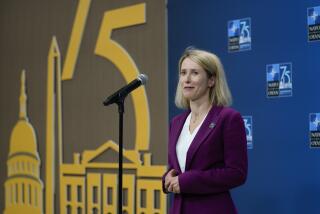In Baltics, Rising Living Standards Overshadow Political Soap Operas
- Share via
RIGA, Latvia — When the reformist prime ministers of Latvia and Estonia resigned in respective huffs earlier this month, the government crises prompted little more than a few sighs and shrugged shoulders among the populace.
Likewise, the fourth change in political leadership in Lithuania in as many years last fall hardly registered on the country’s social or economic meters.
The people of the three Baltic states are far from apolitical after 50 years under Soviet occupation, but the dizzying changes in their post-Communist leaderships no longer strike fear among the masses or deal much of a blow to economic stability.
What speaks louder than the squabbling politicians is the steady improvement in living standards, solidifying middle classes and the most encouraging economic growth in the former Soviet Union.
Lithuania and Latvia each posted nearly 2% economic growth in 1996, and both expect to double that rate this year. Estonia experienced 3% expansion in its economy last year and anticipates 4% for 1997.
Inflation rates in all three countries remain in double digits, but the 10% to 20% annual range is low in comparison with those in other former Soviet republics. Unemployment is a fraction of that suffered by Russia, and salaries are the highest in the 15 newly independent states.
Analysts attribute the Baltics’ social peace and rising prosperity to a commitment to independence nurtured by memories of subjugation among people willing to keep their noses to the grindstone while the ugly business of building democracy is fought out over their heads.
“I wouldn’t call what we have now a crisis,” says political analyst Aivars Ozolins of the biggest Latvian daily, Diena, referring to the months-long face-off within Latvia’s eight-party governing coalition. “It’s really just a reshuffling, which people no longer associate with the progress of reform.”
Indeed, Prime Minister Andris Skele resumed his duties less than two weeks after resigning, and the reseating of a Cabinet is proceeding apace.
Meanwhile, in thriving Estonia--where Prime Minister Tiit Vahi was forced to resign last week after accusations that he had taken advantage of loopholes in housing privatization to secure himself and his daughter coveted apartments in the capital.
Lithuania’s revolving-door leaderships have seen reformers replace Communists, or vice versa, almost every year since the republic declared independence in 1990. But the private sector is growing, and the population remains tolerant of the power upheavals.
“This is long-standing tradition,” Latvian President Guntis Ulmanis says of the region’s political turmoil, making light of the personality clashes in view of the countries’ undeniable advances toward stable market economies.
Foreign diplomats and Baltic officials assign some of the credit for the region’s progress to international programs helping to identify revenue sources and root out crime and corruption. Britain’s customs authorities, for instance, have been carrying out joint patrols with Baltic police, resulting in a tenfold increase in duty collection as the forces intercept smugglers.
Still, although the Baltic states are post-Soviet performance leaders, one senior Western envoy warns that “the perception of tranquillity can be overdrawn.”
All three countries have huge populations of retirees--25% or more--drawing on the public coffers and overwhelming the flimsy social safety nets. Corruption afflicts every government in the former Communist world, and tax evasion continues to be considered a noble act of rebellion.
Latvia and Estonia also encompass huge “noncitizen populations”--a euphemism for the stateless Russians left behind after Soviet troop withdrawals, who form nearly one-third of each republic’s population.
But citizenship laws that have taken effect will eventually allow those displaced by history to take on new national identities if they so choose and become full-fledged members of the societies moving swiftest and surest toward prosperity in the post-Communist era.
More to Read
Sign up for Essential California
The most important California stories and recommendations in your inbox every morning.
You may occasionally receive promotional content from the Los Angeles Times.














